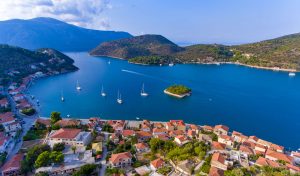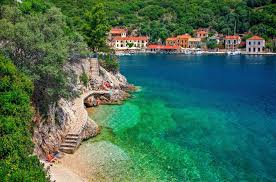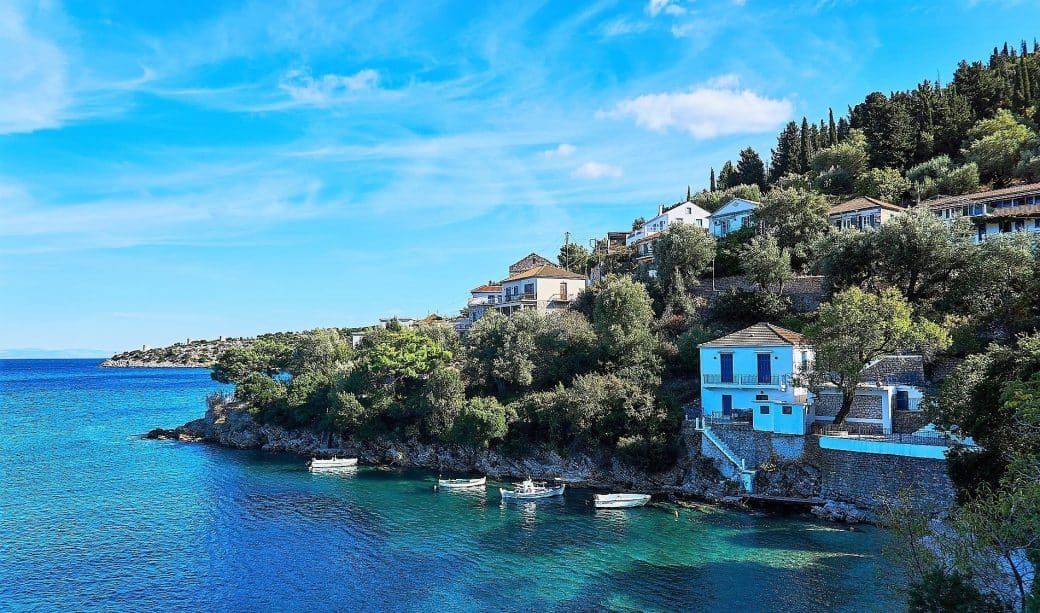Ithaca, the island of Odysseus, is famous for its unparalleled beauty and mythical character. In summer, its shores are filled with tourists who are enchanted by the blue sea and the tranquility of the landscape. But what happens when the summer lights go out? What remains when the island goes into hibernation, away from the echoes of tourists and the hustle and bustle of busy streets?
Winter in Ithaca is a time of deep silence, almost a mystery. It is the time when the island returns to its own rhythms, revealing a different world, full of challenges and opportunities. Walking through the narrow streets of Vathy in December, life seems to flow more slowly, more quietly, but not without its daily spark.
From crowds to… isolation
Winter in Ithaca means isolation. Most shops have closed their shutters. The tourist businesses, which bring the island to life from April to October, are now silent. In Vathy, only two taverns remain open for those who want to eat out. Most residents spend their time at home or in their small groups, away from the hustle of the tourist season, while many invest their free time in a creative activity within the framework of a club or association on the island (read more). We spoke with some residents of the island and present, through their own eyes, life in Ithaca after the summer.
The important thing is to see the glass half full, like Mr. Christos Manolopoulos who participates in many activities on the island and is particularly active. “Because I am involved in hunting, fishing and the athletic team “PROODOS ITHAKIS” I have a full schedule.” Undoubtedly, the nature of Ithaca is a refuge. “Ithaca in winter is like a playground for those who love peace and nature,” says Mr. Giorgos Lialas, owner of the only diving center on the island.
“Of course, if the weather permits, I will go out for a coffee or a drink in one of the few shops in Ithaca that remain open in winter.” Indeed, Mr. Manolopoulos is quick to congratulate these entrepreneurs for their initiative to support the social life of the locals in winter. “Those who own the shops are permanent residents, and those who keep them open I consider very correct professionals; they also pull their own oar these months. Many of these, of course, do not open on weekdays.”
Mr. Alexandros Taflampas also has a full schedule. He is one of the five lawyers on the island and has served as a municipal councilor for three decades. “As lawyers, we have quite a lot of work, especially since we deal mostly with the land registry, and as is known, the island attracts great interest in buying and selling. Of course, most of the residents are involved in tourism, so in winter they are out of work,” he explains.

The challenges of winter & solidarity actions
“Winter is harsh in Ithaca,” says Mr. Tilemachos Gavanoszis, speaking, among other things, about difficulties in transportation and public transport, as well as the lack of dining establishments, which affects social life.
In turn, Mr. Manolopoulos, who has been working in the island’s police force since 1988, describes: “we are 9 police officers in Vathy for the entire island. We don’t have serious incidents; a few minor disturbances, some traffic accidents, especially during the summer months. We don’t have criminal acts; such incidents are rare. Transportation is limited, and if something urgent arises, transfer to Kefalonia is the only solution.” More generally, the issue of insecurity regarding health matters is very high in the hierarchy of concerns for all residents.
Regarding the younger residents of the island, the locals have provided for them, and so there are many athletic and recreational activities for their children. However, the basic issue here is how many years there will still be many children on the island. “A child can do a lot here. They can play sports, go to dance lessons, join the theater and cinema group, if they live in Vathy. If they live in North Ithaca, things are more difficult. We have tutors and teachers on the island; we lack a few specialties. There are quite a few teachers on the island, 90% of the teachers are locals and have settled permanently on the island where we have two primary schools; in fact, in Vathy there are people, while in Stavros, slowly, there are starting to be fewer children,” says Mr. Taflampas.
If something stands out in Ithaca in winter, it is the concept of community!
The clubs, associations, and various actions and initiatives that run through the island are touching in number and in the emotional warmth of the locals. But equally important - and somewhat more so - is the solidarity among the residents.
Concerns about medical issues are intense and justified if we consider that only one health center operates on the island, and patients must then be transported by boat - a coast guard ambulance to the hospital in Kefalonia, in emergency cases. In all other non-emergency cases, citizens must travel by means such as the regular ferry, with all that this entails during the winter months. This problem became particularly visible during periods of economic crisis, and that is how the social clinic was created with the aim of alleviating the hardship and financial burden of residents by providing them with valuable medical services free of charge at regular intervals. More specifically, as Ms. Ourania Louka, Deputy Mayor for Social Policy and Welfare of the Municipality of Ithaca, who is also a doctor and in charge of the Social Clinic, explains: “our idea as a municipality was to create a volunteer-based structure, where we would bring doctors and cover the expenses ourselves. The social clinic started in 2016 to cover the needs of the economically weaker. Essentially, we support the Health Center with volunteer actions.” This is a space equipped with medical beds and portable machines, such as a stethoscope and microscope. Beyond that, doctors of various specialties who visit the island - voluntarily - bring their own medical tools with them. The social clinic’s activities are supported by 14 volunteer residents of the island.
It is worth noting, as Ms. Louka told us, that in addition to doctors' visits, first aid courses are also held on the island by EKAB (National Centre for Emergency Medical Assistance) teams, while an exemplary fact is that all the villages of Ithaca have been equipped with portable defibrillators. The social sensitivity of the municipality is not exhausted in the clinic, as there is also a social grocery store on the island to offer help to people below the poverty line. “The municipality helps where it can and serves its citizens. Currently, we cover 30 households. We renew applications every 6 months. The aid covers everything, from household cleaning products, food, milk, oils, legumes, pasta, shampoo, meat. Anything a family might need to eat. In any case, what we must emphasize is that this is help, we unfortunately do not solve their livelihood problem,” stresses Ms. Louka.

Business opportunities and the future in Ithaca
Work is limited in winter on the island, as Ithaca, as the residents themselves tell us, bases its economy on tourism. Therefore, in winter, most residents are unemployed and mainly engage in agricultural work, while many choose to leave the island during the winter months and return in the summer.
Of course, there are always exceptions that are unable to leave the island. For example, Mr. Lilas, although he left Ithaca years ago for studies, decided to return to the island and engage in business by opening a diving center. “I was born in Vathy, left for studies and returned at 28. From the moment I left, I intended to return to Ithaca. When I got the idea for diving, I decided to come back. The truth is that, to do something in Ithaca, it helps a lot to be a local. For someone to come and invest here is difficult, but not impossible. Today, at 40, I am happy with my choice. The truth is that to do something in Ithaca, it helps a lot to be a local. For someone to come from another place and invest on the island is difficult, but not impossible. I would say that anyone considering returning to the island must have a plan. The island needs doctors and engineers, and those who came here from other places did very well.”
However, what most residents conveyed to us is that the younger generations choose urban centers. “The island doesn’t keep a young person. Because I’m close to the youth, I see that most kids just want to finish high school and leave to study. The youth population is very small. The island is purely tourist-oriented. From late April to late October, anyone can find work. Of course, during the remaining months, Ithaca is 'dead'. After that, those who remain work as builders, plumbers, electricians, or with olive trees and fields,” says Mr. Manolopoulos.
At this point, it is worth mentioning the lack of housing on the island, which is a deterrent for someone to come and live in Ithaca. “There are no houses, and it is difficult for someone to find a house to rent. If a house is in good condition, they rent it for Airbnb,” explains Mr. Lilas.
Of course, in the earthly paradise of the Ionian, opportunities will always arise for those who want to take advantage of them. “There are opportunities on the island for young people, as long as they want them,” says Ms. Mavromatis Ourania, a permanent resident of Vathy. “Of course, for those from university, things are more difficult to find something in their field. In any case, it is a developing place, and there are definitely prospects.” A characteristic example is the decision of the children of a permanent resident of the island, who, as she tells us, “my children chose to stay on the island, permanently knowing what they were doing. They find outlets and interests. The truth is that serious and organized efforts are being made by both the municipality and local bodies to enrich the winter season.”
Finally, Mr. Gavanoszis praises Ithaca but also sets conditions for someone to appreciate its beauty and live there. “If someone is aware and over 18, then yes, they can live here. It is an ideal place for families and children, offering a calm and healthy environment.”
Balance of contrasts
Winter in Ithaca is a time of contrasts. On the one hand, there is tranquility, safety, and a sense of community. On the other hand, there are challenges, such as isolation, inadequate infrastructure, and a lack of socialization.
However, in the silence of winter, Ithaca finds its own rhythm. It is a time of self-discovery, where residents come closer to nature and to each other. For those who stay, Ithaca is not just a place of residence; it is a home that demands dedication but rewards with its beauty and authenticity.
Ithaca gave you the beautiful journey.
Without her, you would not have set out.
But she has nothing more to give you now.
And if you find her poor, Ithaca did not deceive you.
So wise as you became, with so much experience,
you will have already understood what Ithacas mean.
